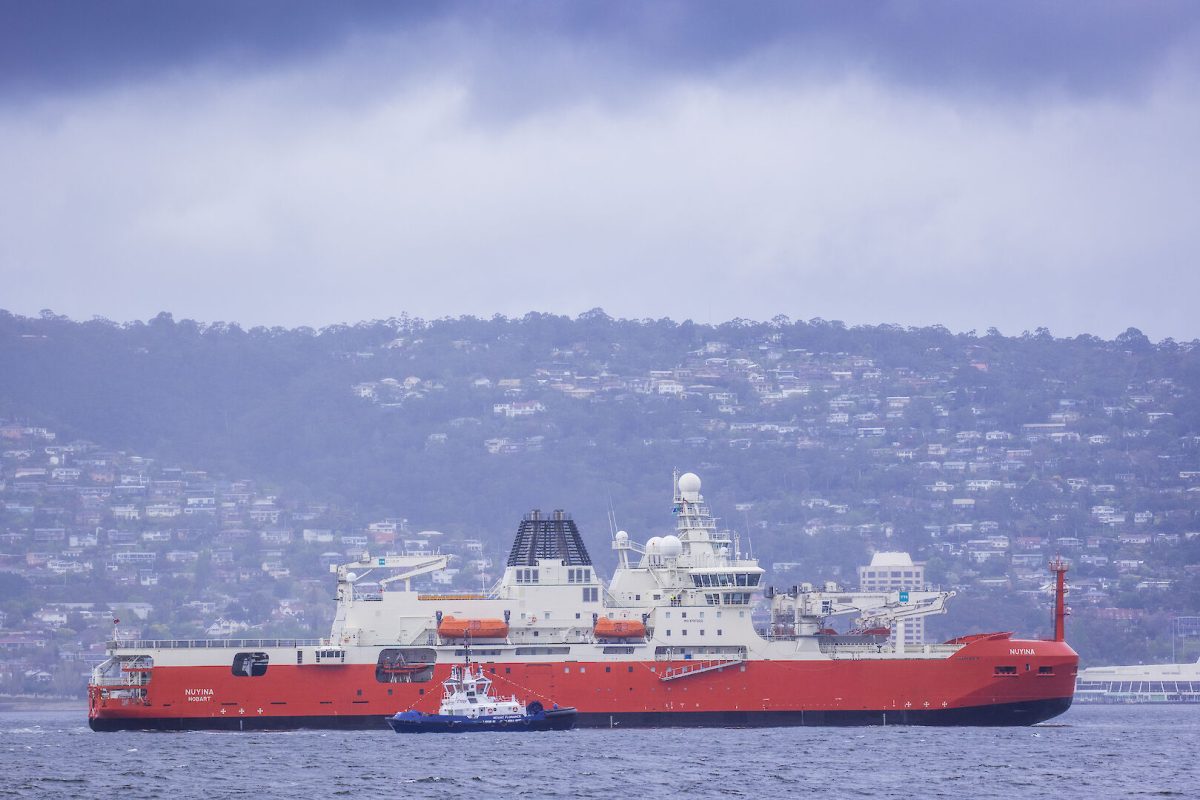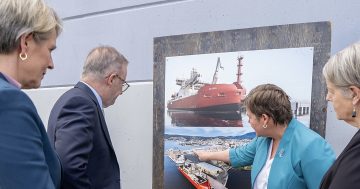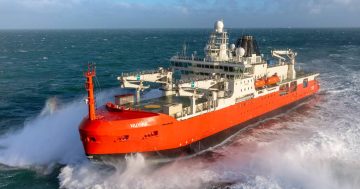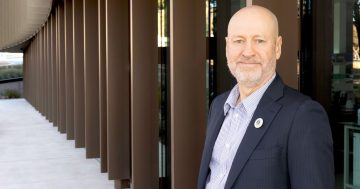
Australia’s most advanced Antarctic research and resupply vessel, RSV Nuyina, arrives in Hobart on 16 October, 2021. Photo: AAD/Rob Blakers.
A Senate inquiry tasked with investigating why the Australian Antarctic Division (AAD) considered pursuing $25 million in budget cuts has laid out 16 recommendations directed across government.
In July last year, AAD head Emma Campbell sent an email to staff outlining the need for the division to ”live within its means” and find $25 million in savings across all of its branches. The email was leaked to the media, who cited the staff’s anger, and led to an inquiry run by the Senate Standing Committee on Environment and Communications.
Since then, the committee, chaired by Tasmanian Greens Senator Peter Whish-Wilson, has been investigating management of the AAD’s funding, which nearly led to 16 per cent of its operating budget being slashed.
“World-record temperature jumps, unprecedented low levels of marginal sea ice and concerning losses of biodiversity recently observed in Antarctica means there has never been a more important time for our nation to invest in Antarctic and Southern Ocean science, and the Australian Antarctic Division (AAD) that delivers this science,” Senator Whish-Wilson said.
“But in a classic case of ‘watch what we do, not what we say’, the AAD has not conducted a dedicated marine science voyage to the Antarctic or Southern Ocean for five years, nor conducted a marginal sea ice expedition for 10 years.”
Senator Whish-Wilson said the AAD had a $500 million state-of-the-art icebreaker and floating science platform (RSV Nuyina) that had been plagued with problems and delays to service since it was commissioned five years ago. The issues affecting RSV Nuyina include:
- Its inability to travel under Hobart’s Tasman Bridge, meaning for it to refuel, it has to make a 660 km detour that costs an extra $875,000 a year.
- Dysfunctional cranes found during a recent trip to Mawson station, allowing only half the ship’s cargo to be offloaded – which led to plans for a resourcing airdrop by Defence.
- Industrial action against the ship’s private operator, Serco, which prompted the AAD to consider hiring a second vessel to retrieve expeditioners from Macquarie Island.
The inquiry also found the number of scientists on Australian Antarctic bases has more than halved over the past decade, and that “serious cultural issues” continued to plague morale and led to the loss of personnel and experienced Antarctic scientists – “even after multiple reviews and changes of senior leadership”.
The inquiry focused on two key funding concerns: a budget overspend of nearly $42 million in the 2022-23 financial year, and a reduction in funding between 2022-23 and 2023-24 of nearly $30 million.
While the committee accepted the uncertainty of shipping and access to RSV Nuyina was a key driver of this overspend, “It is bewildering to imagine how an overspend of over $40 million could not be identified and addressed by relevant officials until after the fact, nor raised with the relevant Minister’s office.
“It does not appear there was any contingencies in place in the event the Nuyina was unavailable, and a second ship was required, nor any real consideration of how such events could impact the AAD and its science budgets in future years.
“Together, these issues suggest significant governance and reputational risks for the division, and by extension, the standing of Australia in its Antarctic Territory.”
Senator Whish-Wilson said while there had been changes and positive developments at the AAD in recent months, there was no better time than now for the Federal Government to make a significant long-term investment in Antarctic science and put words into action.
Notable recommendations in the committee report include:
- Publishing annual accountability metrics, like the proportion of AAD staff engaged in a science role.
- Launching an independent review of the management, culture and performance of the AAD’s operations and logistics branches.
- Prioritising development and implementation of an integrated planning model so important future projects are not delayed or dropped.
- Immediately re-advertising the 20 positions originally announced in 2022-23 but were never filled, progress recruitment of ongoing staff wherever possible, and for extra staffing within the science branch.
- Providing ongoing annual funding to research initiatives in collaboration with universities.
- Developing a business case for the acquisition of a second vessel that would be primarily deployed for logistics, allowing RSV Nuyina to focus more on science projects.
- Resolving any outstanding matters related to the redevelopment of Wharf 6 at Macquarie Point, including issues of funding and the contract provisions with TasPorts in a fair and appropriate manner.
- The Auditor-General undertaking its potential 2023-24 audit into the effectiveness of the Department of Climate Change, Energy, the Environment and Water’s management of Australia’s Antarctic presence.
The participating Coalition Senators Jonathon Duniam and Ross Cadell noted in additional comments that they were pleased to agree with the overwhelming majority of the content and recommendations in the chair’s report.
However, they made seven new recommendations, declaring they were not inclined to support the small set of calls for open-ended new funding and further formal reviews “after so many have already been exhaustively undertaken over recent years”.





